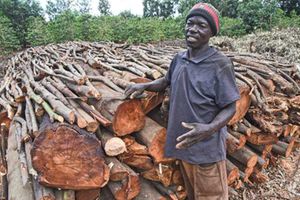LETTERS TO THE EDITOR: We are in danger of losing a generation of scholars

A graduation ceremony at Egerton University. Godwin Siundu, who ironically teaches literature at the university where the lady studied, is undoubtedly concerned about what ails the disciple. PHOTO|FILE
What you need to know:
Godwin Siundu, who ironically teaches literature at the university where the lady studied, is undoubtedly concerned about what ails the disciple.
I want to tell Prof Siundu that the rot is in the entire education system, and not just in literature.
I feel the literature department takes the lion’s share of the blame over deadwood graduates due to its vibrancy that other departments to not have.
We are in danger of losing a generation of scholars
Oumah Otienoh
The article by Godwin Siundu titled ‘Literature is under siege, but literary intellectuals are silent’ (Saturday Nation, January 23, 2016) painted a true picture of the rot in our literature departments in universities. It was a scary piece of work from the literary scholar.
These pages have over time provided enough solutions to the woes that bedevil the once so vibrant literature as a discipline studied in our iniversities.
In the past, I have received hostile reactions from some of my colleagues in the literature department whenever I challenge them to occupy the ‘Readers Corner’ in some way to save the discipline currently at its death bed.
Sometime back, I wrote about a female pal, a literature graduate who refused to write a joint piece with me on Ngugi wa Thiongo’s Weep Not , Child that was then celebrating its 50th anniversary. The acquaintance told me that the literature she had learnt at
university did not endow her with the requisite skills to critique authors and their works.
Godwin Siundu, who ironically teaches literature at the university where the lady studied, is undoubtedly concerned about what ails the disciple.
I want to tell Prof Siundu that the rot is in the entire education system, and not just in literature.
I feel the literature department takes the lion’s share of the blame over deadwood graduates due to its vibrancy that other departments to not have.
The decay in our education system has lived with us for almost two decades now.
Way back in 1998, the University of Nairobi admitted its first batch of self-sponsored students who did not meet the cut-off points for direct admission into it’s various faculties. That is when this rain started beating us.
The varsities then started to over enrol students into various degree programs that their teaching staff could not handle.
It worsened during the Kibaki regime when many satellite campuses were turned into fully fledged universities. The small campuses that gained autonomy mooted a legion of courses that they could barely handle.
Very soon, lecturers started moonlighting, teaching in various other universities to make an extra coin.
This certainly was the genesis of the academic trouble we find ourselves in as a country.
In a report presented sometime back by the Kenya Institute of Public Policy Research and Analysis (KIPPRA), up to 50 percent of university teaching staff are involved in part-time occupation and, in particular, teaching in other universities.
We should not be surprised with this turn of events. Currently, the Commission of University Education has shut down 10 satellite campuses of Kisii University.
This is the ultimate price we are now paying as a country.
We may feel sorry for Kisii University and, in particular, five of its recent PhD graduates whose certificates have been revoked, but the trillion shilling question is, how many such graduates from other universities have managed to enter the job market?’
The World Bank in 2015 observed that the country ambitiously continues to churn out graduates who lack the requisite skills in their areas of specialisation.
Graduates have had to suffer the pain of possessing unrecognised academic papers when professional bodies suspend some courses such as engineering and medicine.
I recently visited a local public university and left convinced that we will continue to produce tabula rasa graduates. The book shelves in the library only had a few reference books, proof that the students themselves had lost hope of searching for knowledge from their only reservoir of information.
With the current WhatsApp generation that is ever on social media even during lecture sessions, the university education standards are expected to plummet further.
The writer teaches at Ng’iya Girls’ High School in Siaya County. He is an author of several secondary school revision books. [email protected]
***
Classic books have lost their place in system of education
Sunday Memba
Francis Scott Key Fitzgerald, an American novelist and short story writer, in his book, The Beautiful and the Damned, wrote: “A classic is a successful book that has survived the reaction of the next period or generation. Then it’s safe, like a style in
architecture or furniture. It’s acquired a picturesque dignity to take the place of its fashion…”
Reading classics is not longer encouraged in Kenya classrooms. I’m sure Philip Ochieng would be surprised if he saw a young Kenyan citizen leafing through Ernest Hemingway’s The Sun Also Rises or Alexandre Dumas’ The Count of Monte Cristo.
I hold the view that ignoring classical books does more harm than good to our education. It is the sine qua non of a fertile brain.
A good education system must tap the intellectual waters of classical writings for the flowers to blossom. These books have stood the test of time and should be embraced.
To instil and install the dictates of classical literature in the students of this nation, a raft of measures have of be considered. First, the ministry of Education should include these books as set books in secondary education. It harms less for students to partake in reading Harper Lee’s To Kill a Mockingbird in order to attain a high school level certificate.
Excerpts of classics should also be married into the course books of English and other reading texts. Newspapers should also dedicate some print space to short classical stories or poems.
Furthermore, each of us should make a personal and binding choice to buy and read at least one classic book every two months. This move could cultivate a good nursery bed for future readers. They will learn as they see.
However, classical reading is not the panacea for our dwindling reading culture. This is because it has its shortcomings, too. Some classical books are manifestly written in old English. This so demands that these books undergo some revision to make them
palatable to prospective readers.
Also, some classics need to be taught avidly so that students may ‘swallow and digest’ as Chinua Achebe puts it in his book Anthills of The Savannah. This is because some may not necessarily have a good succession of sentences or ideas to a young mind.
Classics do call for serious and sustained thinking and hence midwifing by tutors may be essential.
In finishing up, I urge that this clarion call to re-invigorate classics into our education should be heeded. It should thus serve as a wake-up call to those who strive to see this country leap forward.
***
Banish marketers from drama fete
Francis Odipo
The annual Kenya Schools and Colleges Drama Festival, featuring schools, colleges and universities, is back with us again. It will culminate in the national finals in Meru County.
To the best of my knowledge, this is one of the most involving co-curricular activities in the Education ministry’s calendar. It calls upon nothing but talent. Right from the level of hatching an idea, scripting it, auditioning, casting, rehearsals up to the performance itself, a lot of time and money goes into it.
The event’s rules, regulations and guidelines are noble and clear. The vision reads: “To provide Kenyan youth with artistic talent for national development.”
The mission statement says: “To identify, nurture and develop the hidden artistic potential of the Kenyan youth by providing opportunities for self-expression and actualization”.
If children in primary schools are to have their talent nurtured, as brought out in the mission statement, they need to be encouraged to exploit it starting from the level of scripting up to the actual performance.
For teachers to purport to script for the children is to ignore the learners. This denies the youth, who are the actual owners of the activity, the opportunity to do their thing.
Instead of gathering teachers at workshops all over the country, as is happening now, the ministry should spend these resources on talented learners. Teachers should identify such learners and take them along to those workshop. After all, this is the learners’
festival, not teachers’.
Most disheartening is when the scripting, auditioning and even training of performers is done by strangers — people who do not even have the basics in handling learners. In most cases, the strangers are driven by nothing but quick monetary rewards.
Secondly, drama tests creativity. It is not a marketing forum where manufacturers of goods and providers of services go to showcase their products on stage. Business people should not be allowed to take over the stage the way they have been doing of late.
They have found a free stage for marketing their products in the name of sponsoring stage performances that talk well of them. Fliers, T-shirts, caps and booklets the innocent children carry home only help the multinationals. In business, this is free
advertising.
Those who enjoy performing set pieces under the auspices of certain multinationals or Non-Governmental Organisations should be shown where that can be done best. They should not misuse children.
Organisers should resist temptations from business people out to sponsor certain genres, and who specify how and what to be scripted. The festival should be left to return to where it was before, when creativity ruled the stage, not business advertising. Only then shall drama be what it should be.
The writer is a motivational speaker author of Stella at Crossroads and The Bridgeline Revision series, commentator of matters education and a drama adjudicator
***




